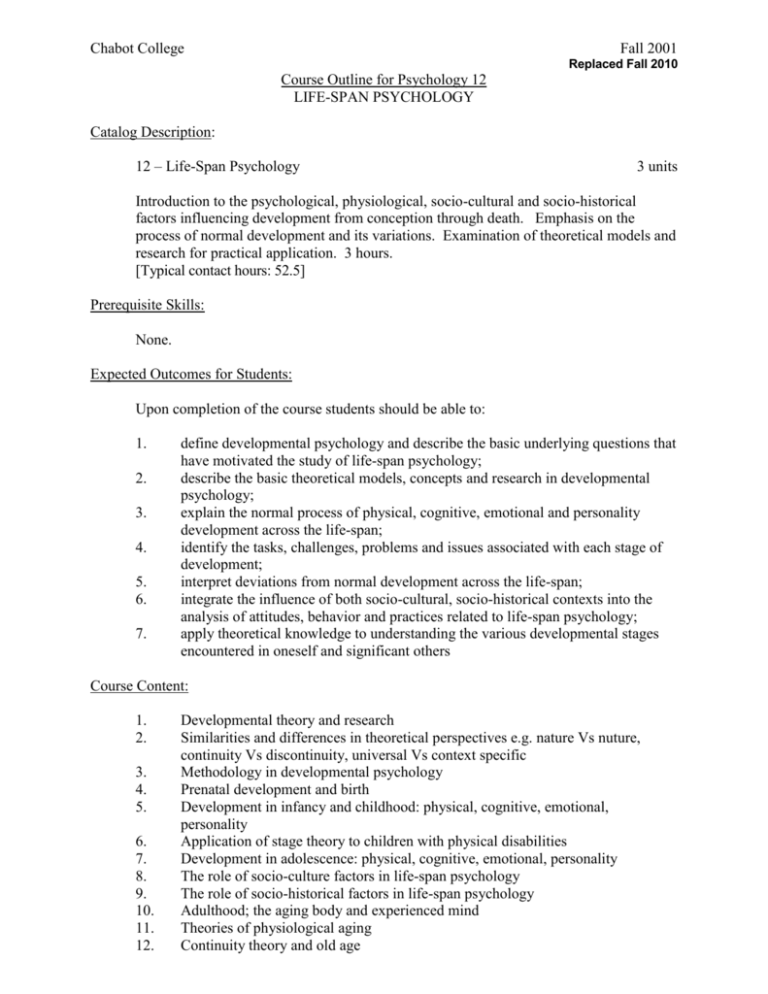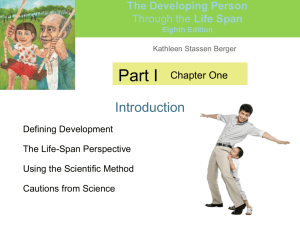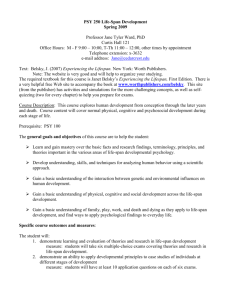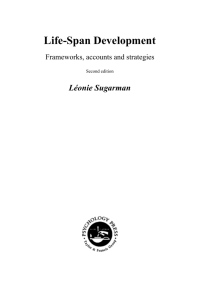Life-Span Psychology
advertisement

Chabot College Fall 2001 Replaced Fall 2010 Course Outline for Psychology 12 LIFE-SPAN PSYCHOLOGY Catalog Description: 12 – Life-Span Psychology 3 units Introduction to the psychological, physiological, socio-cultural and socio-historical factors influencing development from conception through death. Emphasis on the process of normal development and its variations. Examination of theoretical models and research for practical application. 3 hours. [Typical contact hours: 52.5] Prerequisite Skills: None. Expected Outcomes for Students: Upon completion of the course students should be able to: 1. 2. 3. 4. 5. 6. 7. define developmental psychology and describe the basic underlying questions that have motivated the study of life-span psychology; describe the basic theoretical models, concepts and research in developmental psychology; explain the normal process of physical, cognitive, emotional and personality development across the life-span; identify the tasks, challenges, problems and issues associated with each stage of development; interpret deviations from normal development across the life-span; integrate the influence of both socio-cultural, socio-historical contexts into the analysis of attitudes, behavior and practices related to life-span psychology; apply theoretical knowledge to understanding the various developmental stages encountered in oneself and significant others Course Content: 1. 2. 3. 4. 5. 6. 7. 8. 9. 10. 11. 12. Developmental theory and research Similarities and differences in theoretical perspectives e.g. nature Vs nuture, continuity Vs discontinuity, universal Vs context specific Methodology in developmental psychology Prenatal development and birth Development in infancy and childhood: physical, cognitive, emotional, personality Application of stage theory to children with physical disabilities Development in adolescence: physical, cognitive, emotional, personality The role of socio-culture factors in life-span psychology The role of socio-historical factors in life-span psychology Adulthood; the aging body and experienced mind Theories of physiological aging Continuity theory and old age Chabot College Course Outline for Psychology 12, Page 2 Fall 2001 Course Content (Cont'd): 13. 14. Death, dying, and bereavement Developmental variations and psychopathology Methods of Presentation: 1. 2. 3. 4. Lecture, discussion Group and paired activities Videos accompanied with worksheets Individual problem-solving assignments and activities Assignments and Methods of Evaluating Student Progress: 1. Typical Assignments a. individual journals of the developmental process experienced thus far incorporating, depth, insight and application of theoretical understanding. b. writing assignments that analyze myths, old wives tales and cultural notions related to prenatal development with theory learned in class c. group project of a children’s picture book (or phamplet dependent upon the age selected) for someone ages 3 – 15, which conveys developmentally appropriate content d. current news articles related to socio-cultural and socio-historical issues in life span psychology 2. Methods of Evaluating Student Progress a. quizzes, midterm and final b. student journal c. individual assignments d. group project Textbooks(s) (Typical): Human Development: A Life-span View, Robert V. Kail and John C. Cavanaugh, Wadsworth, Belmont, California, 1999 Special Student Materials: None. tf: A:/CURRICUL/Fall 00/Psy.12.doc Revised 11-30-00






